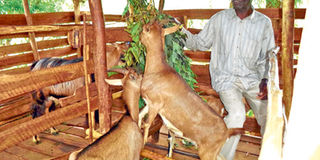Hey, big rewards await you in a farmers’ group

Mr Tom Okeyo feeds his goats. EVERLINE OKEWO
What you need to know:
- A farmer can easily trace his lost goat when he is a member of the association because all animals are registered, have a tattoo and are coded.
- Alex Omwela is a livestock officer at the Ministry of Agriculture, Vihiga County and a technical officer with the association. He says farmers are better off in an association than going sole.
- The farmers feed their goats on lucerne, mulberry, desmodium, calandria and shrubs. Okeyo invested Sh500,000 bank loan in the dairy goats project.
The hairy Alpine goat darts around the farm in Mamboleo, Kisumu as it bleats.
It then enters a pen where it joins five others feeding on napier grass from a trough.
“It is hard to tell what has frightened it,” says Tom Okeyo, the owner of the farm as he checks on the animals to ensure they are fine.
Okeyo keeps 10 dairy goats, a buck and 50 kids on 0.5 acres, which he has leased.
The accountant with an engineering firm in Kisumu easily juggles between his work and goat keeping.
And he credits the ease to being a member of the Dairy Goats Association of Kenya, which he joined last year after paying a subscription fee of Sh500.
“Through the association, I have been able to learn the best dairy farming practices that enable me manage the business even without being there full-time.”
Each of his goats has a record card containing the name of the goat, date of birth, name of the breeder, the tattoo number, birth weight, volume number, weaning weight, the place of birth, farmer’s group code and the dam name.
It also captures the date of service, buck tattoo number and breed, date of kidding, number of kids born and birth weight.
The farmer also keeps fertility, health, production and transfer records. The latter captures the owners’ names, address and farmers’ group.
“We record details of the owner of the goat for traceability. In case one wants to confirm something from the previous owner, it is easier to reach them,” explains Okeyo, who has employed Austine Ochieng to manage the business.
Away from Okeyo’s farm, his neighbour Caleb Olang’o keeps 11 dairy goats, also under zero-grazing system.
The assistant chair of the association, Kisumu branch, says farmers are assured of getting quality goat breeds, market as well as subsidised training and vaccination services.
“After every two weeks, my goats are vaccinated against tetanus and pneumonia. They are also dewormed and sprayed. All this is because I belong to the association.”
TRACE HIS LOST GOAT
A farmer can easily trace his lost goat when he is a member of the association because all animals are registered, have a tattoo and are coded.
The other advantage of being a member of the group, according to Olang’o, is that one can exchange his animals with a colleague to get quality breeds and avoid inbreeding.
Currently, he milks three goats. Each goat produces three litres of milk per day, with a litre going for Sh200. In a month, he pockets Sh42,000, excluding his expenses.
He also sells manure, with a bag of 70kg retailing at Sh1,200.
“Nothing happens on the farm that passes me concerning the animal welfare because everything is captured on the card. When I come in the evening, I first start by checking the cards, then the goats,” notes Okeyo. The farmer, like Olang’o, milks three of the 10 goats twice a day and gets two.
to three litres of milk from each. He sells a litre at Sh200 to a hospital in Kisumu.
The farmer also sells the animals at between Sh14,000 and Sh18,000, depending on the size. He also offers breeding services.
“I charge any farmer who brings his goats to be serviced on my farm Sh200 and an additional Sh150 a day for feeding. The goat spends about 18 days with the buck and must be fed well during insemination. I only deal with members of the association.”
The farmers feed their goats on lucerne, mulberry, desmodium, calandria and shrubs. Okeyo invested Sh500,000 bank loan in the dairy goats project.
Alex Omwela is a livestock officer at the Ministry of Agriculture, Vihiga County and a technical officer with the association. He says farmers are better off in an association than going sole.
“The association provides training and lessons on record keeping, value addition and markets. The association provides the record card and registers dairy goats and maintains the history records of all livestock.”
The association further provides services like deworming and hoove cutting to prevent foot rot. To be a member, one must be a dairy goat farmer and belong to a registered self-help group with a maximum of 25 and minimum of 10 people.
A farmer must pay a registration fee of Sh500 and an annual subscription fee of Sh200.
The western branch of the association covers Siaya, Kakamega, Vihiga, Nandi, Bungoma, Busia and Trans Nzoia. The head office is in Mbale.





